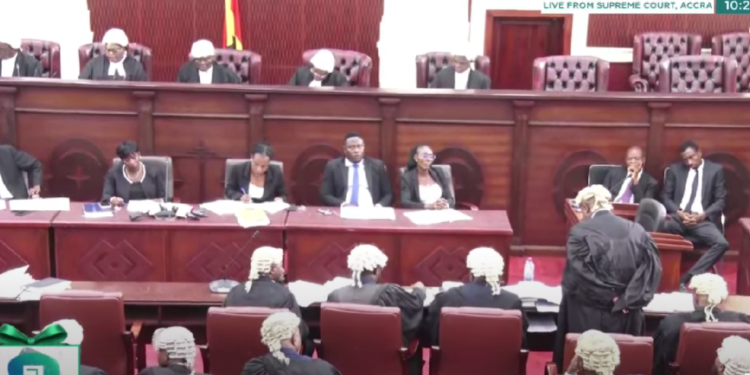The National Democratic Congress (NDC) has accused the trial judge who ordered the Electoral Commission (EC) to re-collate election results in nine contested constituencies of bias and procedural errors.
The High Court’s December 20 ruling, which followed a mandamus application by New Patriotic Party (NPP) parliamentary candidates, directed the EC to re-collate results in constituencies where irregularities had been alleged. The NPP argued that discrepancies in the results necessitated verification for transparency and accuracy.

While some viewed the ruling as reinforcing the EC’s constitutional obligation to ensure credible elections, the NDC criticized it as controversial and legally flawed.
The EC complied with the order in seven constituencies, but the re-collation processes for Dome/Kwabenya and Ablekuma North remain unfinished.
During Supreme Court proceedings on Friday, December 27, the NDC’s Director of Legal Affairs, Godwin Edudzi Tamakloe, argued that the High Court’s decision violated principles of natural justice. He claimed the NDC was denied the chance to present its case, which heavily influenced the outcome.
The NDC also alleged that the trial judge demonstrated bias and failed to observe important procedural requirements. Tamakloe pointed to a “non-jurisdictional error of law,” asserting that the judge neglected Order 55 Rule 5 (2) of CI 47, which mandates that parties with a stake in a mandamus application be notified and allowed to respond.
The accusations of judicial misconduct and procedural errors have added complexity to the ongoing legal dispute, with the Supreme Court’s decision expected to have significant consequences.
“Our ground for this application is that the orders made by the High Court were made in breach of the applicant’s rights to be heard. The further ground is that the trial judge demonstrated apparent bias and partiality.
“There was a non-jurisdictional error of law by failing to exercise the court’s powers under Order 55 Rule 5 (2) of CI 47 to direct second to sixth interested parties to serve the mandamus application on the applicant who have interest in the dispute.”





















































![[FREE FREE MONEY] Predict and Win a Guaranteed GH¢200 From Us EVERY WEEK](https://wordpress.ghanatalksradio.com/wp-content/uploads/2022/02/Predict-and-Win-Final-09-03-2021-218x150.jpg)
![[Predict & Win – 8th/Oct.] WIN A Guaranteed ¢200 From Us This Week](https://wordpress.ghanatalksradio.com/wp-content/uploads/2021/10/maxresdefault-16-218x150.jpg)
![[Predict & Win – 2nd] WIN A Guaranteed ¢200 From Us This Week](https://wordpress.ghanatalksradio.com/wp-content/uploads/2021/09/maxresdefault-50-218x150.jpg)
![[Predict & Win – 25th] WIN A Guaranteed ¢200 From Us This Week](https://wordpress.ghanatalksradio.com/wp-content/uploads/2021/09/maxresdefault-36-218x150.jpg)
![[Predict & Win – 18th] WIN A Guaranteed ¢200 From Us This Week](https://wordpress.ghanatalksradio.com/wp-content/uploads/2021/09/maxresdefault-23-218x150.jpg)










![[National cathedral] See full list of churches that have contributed since 2018](https://wordpress.ghanatalksradio.com/wp-content/uploads/2020/09/Ghana-National-Cathedral-GhanaTalksRadio-100x70.jpg)
![[2024 Budget] Dr. Cassiel Ato Forson says Ofori-Atta lacks knowledge on parliamentary rules](https://wordpress.ghanatalksradio.com/wp-content/uploads/2023/07/budget-100x70.jpg)


